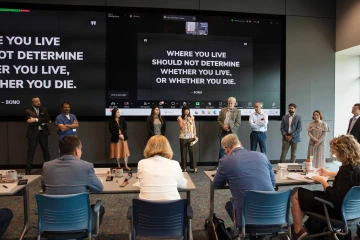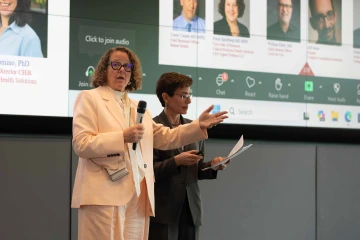2 Health Sciences-led teams win awards in Big Idea Challenge
Two teams led by University of Arizona Health Sciences experts have been chosen as 2025 Big Idea Challenge awardees.
The challenge, which is administered by the Office of Research and Partnerships, is designed to accelerate transdisciplinary projects that have the potential to transform lives, shape policy, drive economic impact and provide training for the next generation of talent.
The inaugural challenge elicited 72 proposals from 19 units across the university. Submissions came from teams spanning a broad range of career stages, from undergraduate students to senior faculty members. Six teams in total were chosen for the awards.
“The teams selected as awardees of the 2025 Big Idea Challenge exemplify the kind of visionary thinking and convergent research that define Arizona’s research enterprise,” said Tomás Díaz de la Rubia, PhD, senior vice president for research and partnerships. “They are not only pushing scientific boundaries; they are building solutions with real-world impact for Arizona and the world.”
One of the winning Health Sciences proposals, titled “Convergent Digital Health for Remote Access,” or CoDiRA, is made up of a multidisciplinary Health Sciences team, including:
- Srikar Adhikari, MD, a professor of emergency medicine at the U of A College of Medicine – Tucson
- Vignesh Subbian, PhD, interim director of the BIO5 Institute, associate director of the U of A Health Sciences Center for Biomedical Informatics and Biostatistics and an associate professor of medicine at the College of Medicine – Tucson
- Shu Fen Wung, PhD, a professor at the U of A College of Nursing and a member of the BIO5 Institute
- Shravan Guruprasad Aras, PhD, the assistant director of sensor analytics and smart devices platforms at the Center for Biomedical Informatics and Biostatistics
- Nirav Merchant, director of the U of A Data Science Institute and a member of the BIO5 Institute
- Nicole P. Yuan, PhD, MPH, an associate professor at the U of A Mel and Enid Zuckerman College of Public Health.
- Lifeng Lin, PhD, an associate professor at the Zuckerman College of Public Health.

Members of the Convergent Digital Health for Remote Access proposal present their idea for the Big Idea Challenge during a pitch event.
Photo by Leslie Hawthorne Klingler, U of A Research Development Services
The proposal will address the urgent national and global crisis caused by a lack of access to timely health care through CoDiRA, an interdisciplinary initiative that will leverage artificial intelligence, wearable sensors, immersive XR technologies and community-integrated digital health kiosks to transform health care delivery globally.
According to the proposal, CoDiRA will reimagine health care as intelligent, decentralized, personalized, culturally responsive and continuously accessible. It aims to substantially reduce global health care disparities and improve health outcomes, particularly for historically marginalized and underserved populations. Its modular, scalable approach uniquely positions it as a model for rapid, global deployment — particularly within low-resource and rural environments.
"Being selected as one of the Big Idea Challenge winners is both an honor and a powerful affirmation of the bold vision behind CoDiRA,” said Adhikari. “This recognition highlights the strength of our transdisciplinary team, the deep collaborative spirit across colleges and the unwavering support of the University of Arizona. Winning this award allows us to take a major step forward in improving health care access for underserved populations, moving from concept to the implementation of digital health solutions with real-world impact.”
“CoDiRA embodies a significant innovation, tackling the ongoing challenges of implementing and scaling digital health solutions in real-world contexts,” Wung said. “We aim to realize the promise of accessible health care in the environments where people live and work.”
The proposals had to address any of six overarching focus areas: data, information systems and artificial intelligence; defense and national security; energy and environmental sustainability; the future of health and biomedical sciences; the human experience; and space sciences.
The other Health Sciences awardees propose to create the Heat and Health Resilience Innovation Consortium, which would integrate the expertise of a broad range of U of A colleges and external partners to create a transdisciplinary ecosystem of approaches to improve heat-health outcomes.
The multidisciplinary Health Sciences team members supporting this project include:
- Amelia Gallitano, MD, PhD, a professor of basic medical sciences at the U of A College of Medicine – Phoenix and a member of the BIO5 Institute
- Freya Spielberg, MD, MPH, a clinical professor in family, community and preventive medicine at the College of Medicine – Phoenix
- Kacey Ernst, PhD, the department chair and a professor in epidemiology and biostatistics at the Zuckerman College of Public Health
- Frederic Zenhausern, PhD, MBA, director of the Center for Applied NanoBioscience and Medicine at the College of Medicine – Phoenix and a member of the BIO5 Institute
- Sharry Veres, MD, chair of the Department of Family, Community and Preventive Medicine at the College of Medicine – Phoenix
- Julia Jernberg, MD, MBA, a clinical professor of medicine and director of the ambulatory medicine clerkship at the College of Medicine – Tucson
- Brian Drummond, MD, a clinical professor in emergency medicine at the College of Medicine – Tucson
- Heidi Brown, PhD, MPH, a professor and program director of epidemiology at the Zuckerman College of Public Health
- Mona Arora, PhD, an assistant research professor in the Department of Community, Environment and Policy at the Zuckerman College of Public Health
- Sriram Iyengar, PhD, an associate professor and director of clinical outcomes research – internal medicine at the College of Medicine – Phoenix.

Freya Spielberg, MD, MPH, (left) a clinical professor in family, community and preventive medicine, and Amelia Gallitano, MD, PhD, a professor of basic medical sciences, both at the College of Medicine – Phoenix, present their proposal for the Big Idea Challenge during a pitch event.
Photo by Leslie Hawthorne Klingler, U of A Research Development Services
Their proposal notes that Arizona is home to one of the hottest counties in the country, Maricopa County, in which extreme heat resulted in a record 645 deaths in 2023. A recent study estimates that an extended power outage like those that recently occurred in Spain and Portugal could lead to tens of thousands of heat-related deaths across the state.
“It is an honor to have our big idea selected for the inaugural year of the challenge awards,” said Gallitano, a co-lead on the project. “We can’t wait to get started working with the incredibly talented, innovative and committed team that this opportunity enables us to bring together.”
“We look forward to creating a hub of innovation, education and research to decrease the health impacts of heat extremes in Arizona and globally,” said Spielberg, the other co-lead.
Teams selected for the award will receive up to $250,000 a year for two years from the Office of Research Partnerships and support from U of A Research Development Services, Lewis-Burke Associates and Foundation Relations to identify funding opportunities. Additional support for technology transfer and public engagement will be available through Tech Launch Arizona and Tech Parks Arizona.
As a signature Office of Research and Partnerships initiative, the challenge will return in 2027 with a new call for proposals, inviting a fresh wave of big ideas from across the university, all grounded in Arizona’s land-grant mission and global research excellence.
A version of this story appeared on the U of A news website.

